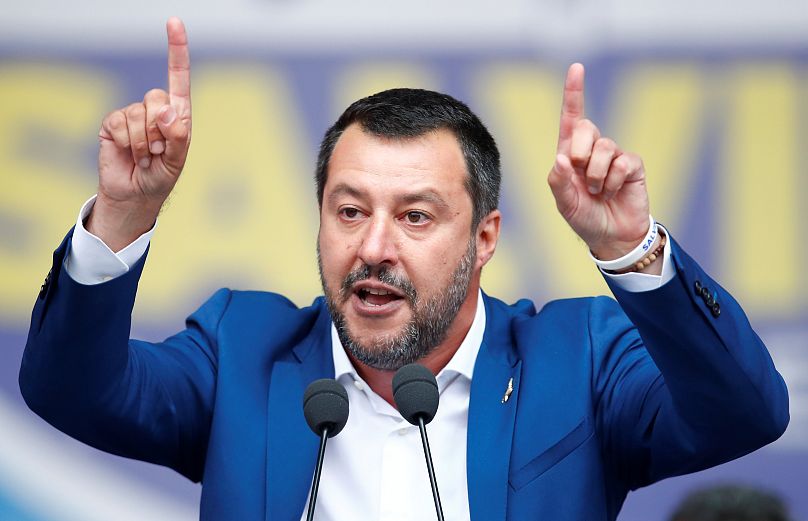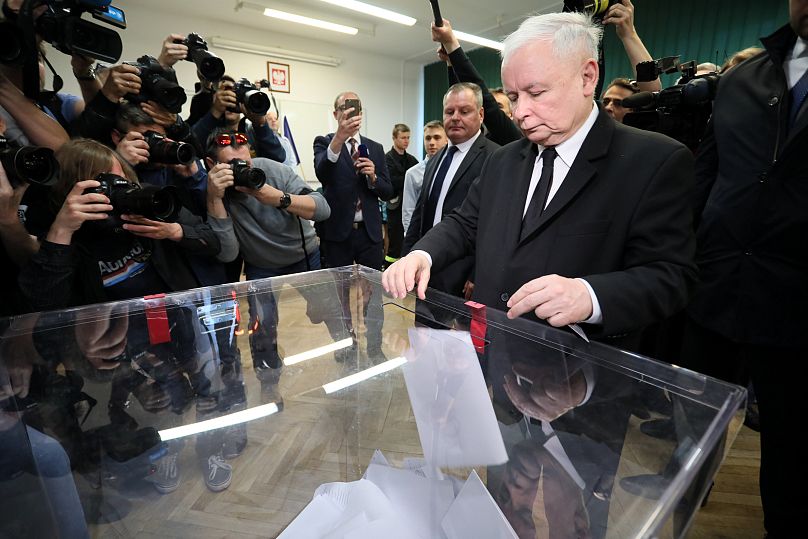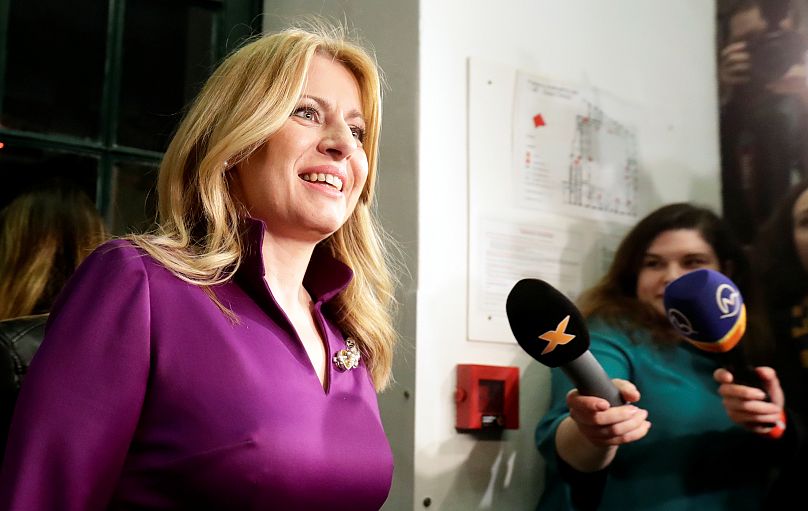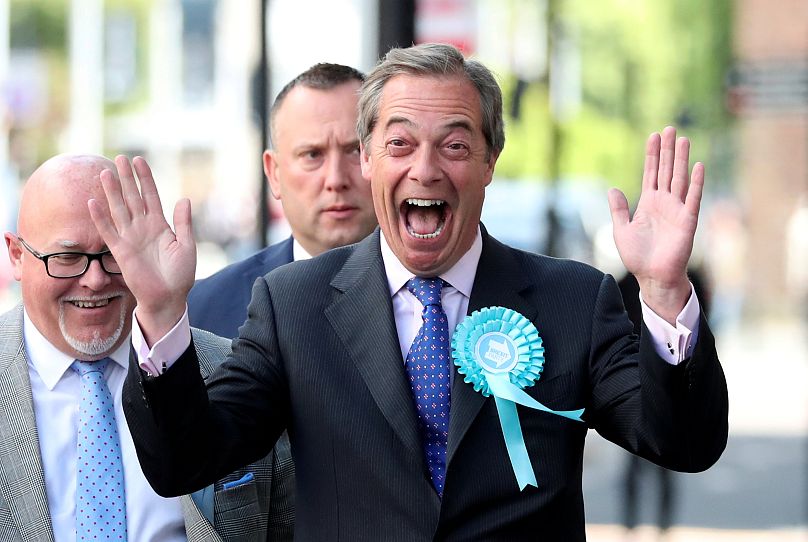At-a-glance summary from the 28 EU nations.
Voters from the 28 member states of the European Union have cast their ballot in what is the second biggest democratic exercise in the world.
Official projections showed parties committed to strengthening the European Union held on to two-thirds of seats in the EU parliament, though far-right and nationalist opponents saw strong gains.
Euronews brings you the results, country-by-country, as they trickle in.
READ MORE: European elections 2019: What happened last night - in one minute
READ MORE: European Parliament elections 2019: all you need to know about how they work
Austria
The ruling People's Party, led by Chancellor Sebastian Kurz, comes in first with 34.9%, according to provisional results. It is followed by the Social Democrats with 23.4% and the far-right Freedom Party (FPO) with 17.2%.
The latter's score is believed to have been hit by the so-called Ibiza scandal which resulted in party leader Heinz-Christian Strache resigning as vice-chancellor last week after a secret video appeared to show him trying to trade public contracts for party donations from a woman he thought was the niece of a Russian oligarch.
Austria scandal: What we know about the video which brought down the government
Belgium
Belgium wasn’t holding just one election on Sunday, but three: federal, regional and European.
For the latter, partial results showed the moderate separatist Flemmish N-VA party had the largest score nationwide, with 13.47% of the votes. The anti-immigrant Vlaams Belang (Flemish Interest) came in second with 11.45%.
While the more prosperous Dutch-speaking Flanders shifted to the right, French-speaking Wallonia moved to the left. The Socialist Party, at 10.5%, came in third nationwide.
The Liberal Party MP of Prime Minister Michel came only in the seventh position.
Bulgaria
Even though voting is compulsory in Bulgaria, voter turnout was only 30.83%.
As pollsters expected, Bulgaria's vote was split between the centre-right GERB party (30.94%) and the country's socialist coalition party (24.24%), according to official estimates.
The youngest current European parliament member is Bulgarian Andrey Novakov, who is 30.
Croatia
Provisional results placed the conservative Democratic Union (HDZ), which rules the country in a coalition, and the Social Democratic Party in the lead with 22.72% and 18.71% of the vote respectively.
The right-wing Croatian Conservative Party is third with 8.52%.
Cyprus
Final results showed the ruling DISY party — an EPP member — came in first with 29.02% of the vote, broadly on par with 2014 results.
Niyazi Kizilyurek, from the communist AKEL party — which came in second place (27.49%) — has become the first Turkish Cypriot to be elected as an MEP.
The country is divided between Greek Cypriots and minority Turkish Cypriots, but over 80,000 Turkish Cypriots are reportedly eligible to vote in EU elections.
Czech Republic
The ruling centrist ANO party increased its number of MEPs from 4 to 6, official results showed. The second biggest delegation from the country is a right-wing formation, the Civic Democratic Party, which doubles its MEPs to 4.
The anti-establishment, anti-corruption Czech Pirate party came in third with three MEPs, tied with the conservative STAN TOP coalition.
Denmark
Provisional results put the Social Democrats in the lead with 23.5%, ahead of the centre-right Venstre party — ruling the country in a coalition — which scored 21.5% of the vote.
The Socialist party was third (13.2%) while the Red-Green Alliance looked set to win its first ever seat at the European Parliament with 10.7%. The People's Movement Against the EU got 3.9%.
Danes are scheduled to return to the poll on June 5 for the country's general election.
Estonia
The liberal Reform party retained its first place with 26.2% of the vote, official results showed.
The Social Democratic party claimed the second place with 23.3% of the vote, while the Centre party was in third with 14.4%.
The far-right Conservative People's Party tripled its score to come in fourth with 12.7% and will be represented in the European Parliament with one MEP.
Finland
The Scandinavian country was the first to officially release its results which saw the centre-right National Coalition Party claiming the top spot, with 20.8% of the vote, slightly below its 23.2% from 2014.
The Green League secured the second place with 16.0%, ahead of the Social Democrats (14.6%) and the populist Finns Party, which makes it in the fourth position with 13.8%.
France
With the votes counted, Marine Le Pen's far-right National Rally party is leading with 23.31%, while the La Republique En Marche movement of President Emmanuel Macron is second with 22.41%.
The National Rally, then-known as the Front National, also won the EU election in 2014 while Macron's movement did not exist then.
The Green party surprised to clinch the third place with 13.47% of the vote.
READ MORE: Le Pen party tipped for Euro election victory over 'failing' Macron
Germany
An exit poll confirmed projections made ahead of the elections that predicted a surge of support for the Green Party, which clinched the second place with 20.5% of the vote — double its 2014 result.
The ruling CDU/CSU alliance has come in first with a reported 28.9% of the vote while the anti-migrant and anti-euro Alternative for Germany (AfD) is fourth with 11%.
Greece
The main opposition party, the conservative New Democracy movement, beat the ruling left-wing Syriza formation with 33.25% and 23.74% of the vote respectively, provisional results showed.
This outcome prompted Greek Prime Minister Alexis Tsipras to call for a snap general election in June.
The country’s economic situation and the name change agreement with North Macedonia have taken precedence over European issues.
Hungary
The National Election Office has announced that the ruling right-wing Fidesz party has won with 52.33% of the vote. The Democratic Coalition came in second with 16.19% with the liberal Momentum movement in third with 9.89%.
Fidesz's victory came despite repeated clashes with Brussels over rule of law and migration. The party has also been suspended from the centre-right European People’s Party grouping in the parliament.
Ireland
Taoiseach Leo Varadkar's part Fine Gael topped the vote for Ireland, taking 29% of the vote.
In joint second places wth 15% were three groups- the conservative Fianna Fail, the Green Party and the overall independents score.
The campaign was dominated by Brexit fears as the UK, Ireland's largest trading partner, is due to leave the bloc.
READ MORE: Fine Gael and Green Party have strong showing in Ireland
Italy
Matteo Salvini's far-right League overtook the Five-Star Movement as Italy's largest party after winning 34.33% of the vote, according to provisional results.
The Five Star Movement is now reported to score the third place (17.07%), behind the centre-left Democratic Party (22.69%).
Latvia
The liberal-conservative New Unity party — aligned with the EPP — retained the first place, although its share of the vote dropped from more than 46% in 2014 to 26.24%, provisional results show.
It is followed by the Social Democratic Party (17.45%) and the right-wing populist National Alliance with 16.4%, the latter of which finished second in 2014 with 14.3%.
Lithuania
Initial results showed the centre-right Homeland Union had won with 19.67% of the vote, followed by the Social Democratic Party with 15.93%. The Farmers and Greens Union clinched the third place with 12.6%.
Lithuania also held the second round of its presidential election which was won by economist Gitanas Nausėda, who is not affiliated to any political party.
Luxembourg
The liberal Democratic Party and the conservative Christian Social People's Party will both send two MEPs to the European Parliament having scored 21.44 and 21.1% respectively.
The Green Party came in third with 18.91% of the vote, official results show.
Malta
Prime Minister Muscat's Labour party won by a landslide with 54.29% of the vote, while the rival Nationalist party trailed far behind (37.9%).
Government corruption was an important topic in Malta during the EU elections as the two major parties have both accused each other of wrongdoing.
Poland
The ruling Law and Justice party (PiS) came first with 45.38% of the vote, provisional results showed.
The European Coalition, led by European Council President Donald Tusk and comprised of his Civic Platform and a group of leftist and rural politicians, came in second with 38.47%.
But turnout, although at a record high for EU elections in the country, still only stood at 43%.
The EU elections kicked off a series of polls in the country: a parliamentary one follows in the autumn before a presidential vote next year.
Portugal
Results show that the Socialist Party has won with 33.38%. The Social Democratic Party has placed — a distant — second with 21.94% with the Left Bloc trailing in third position with 9.82% of the vote.
The Green party, Pan is on 6.88% and might have its first seat in the European parliament.
Romania
Provisional results showed a sharp decline in support for the ruling Social Democrats (PSD) which has clashed with Brussels over anti-corruption and rule of law reforms. The PSD trailed the pro-EU National Liberal Party (PNL) with respectively 23.39% and 26.79% of the vote.
In the last national ballot in 2016, PSD won 45% of the vote.
The A 2020 USR PLUS alliance, which campaigned on anti-corruption and green issues, came in third with 21.4% of the vote.
PNL and other pro-EU parties may have benefited from the fact that there was a referendum being held at the same time on PSD's controversial reforms.
Meanwhile, thousands of Romanian diaspora protested outside embassies and polling stations across Europe Sunday after long queues left many unable to vote.
READ: Angry Romanians protest after being denied European vote
Slovakia
The Progressive Slovakia/Together coalition — led by recently-elected President Zuzana Caputova — has won the EU election with 20.11% of the vote, official results show. The social-democratic SMER party finished second with 15.72% ahead of the far-right People's Party with 12.07%
Read more: How EU elections have seen far-right rise in Slovakian politics
Slovenia
The liberal Democratic Party has retained its top spot with a score pretty much identical to the one in 2014 (26.44%), according to preliminary results released by the State Election Commission with more than 98% of the votes counted.
The centre-left Social Democrats came in second, more than doubling its results from 2014 with 18.65%. The list led by the country's Prime Minister, meanwhile, came in third with 15.58%.
Spain
With more than 99% of votes counted, the Socialist party, led by Prime Minister Pedro Sanchez, had scored an impressive 32.84% — ten percentage points higher than in 2014 and far ahead of the centre-right People's Party's 20.13%.
The far-right Vox Party, which was contending its second EU elections, finished in fifth with 6.2% of the vote, far lower than the 10.3% it gathered in last month's general election.
Catalan separatist leaders Carles Puigdemont and Oriol Junqueras were both elected MEPs, but with question marks over whether they’ll be able to take up their seats, as Euronews looked at in this article.
READ MORE: Independence puzzle for European Parliament
Sweden
Results put the ruling Social Democrats in the lead with 23.6% of the vote. Their coalition partner, the Green Party, actually looks set to lose some four percentage points from 2014 and finish fourth with 11.4%.
This is quite a disappointing score for the Green Party in Greta Thunberg's home country. The teen activist kick-started a global protest last year calling on lawmakers to take more decisive action to tackle the climate emergency.
The far-right Sweden Democrats nearly doubled their score with 15.4%, compared to 9.67% in 2014 to finish third, right behind the conservative Moderate Party's 16.8%.
The Netherlands
The anti-EU, far-right Freedom Party (PVV), which was projected to do fairly well, actually saw its support plummet to 3.55% from 13.2% in 2014, according to provisional results.
Instead, the pro-EU left-wing Labour party is the big winner with 18.9%, followed by the governing (in a coalition) People's Party for Freedom and Democracy with 14.6%.
United Kingdom
With the votes counted, Nigel Farage's Brexit Party is leading its nearest rival, the pro-Remain Liberal Democrats, by a large margin with 31.69% and 18.53% respectively.
The main opposition Labour Party is third with 14.8% while the ruling Conservatives are in fifth with 8.68%.
READ MORE: Farage wins in UK but pro-EU parties make huge gains
Article contributors: Chris Harris, Alice Tidey; Thomas Siemienski; Rafa Cereceda; Rita Palfi; Patrik Ohberg; Pantelis Petrakis; Lillo Montalto Monella; Lauren Chadwick; Carolin Küter; and Sandrine Amiel


















